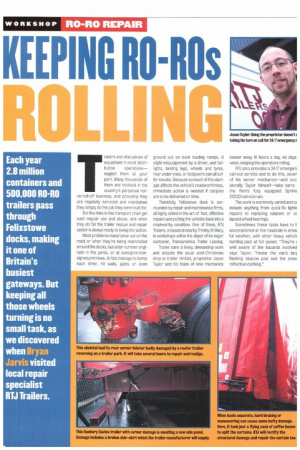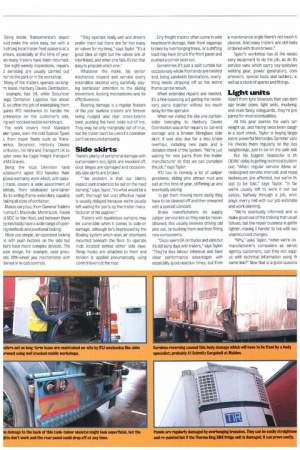KEEPING RO-ROs
Page 46

Page 47

If you've noticed an error in this article please click here to report it so we can fix it.
ROLLIN Trailers are vital pieces of equipment in most distri bution operations— neglect them at your peril. Many thousands of them are involved in the country's perpetual rollon/roll-off business, and providing they are regularly serviced and maintained they simply do the job they were built for.
But few links in the transport chain get such regular use and abuse, and when they do fail the trailer rescue and repair sector is always ready to swing into action.
Most problems materialise out on the road or when they're being marshalled around the docks, but a fair number originate in the yards, or at consignor/consignee premises. Artics manage to bump each other, hit walls, gates or even ground out on dock loading ramps. A slight misjudgement by a driver, and taillights, landing legs, wheels and lyres, rear under-runs, or bodywork can all suffer knocks. Because so much of this damage affects the vehicle's roadworthiness, immediate action is needed if cargoes are to be delivered on time.
Thankfully, Felixstowe dock is surrounded by repair and maintenance firms, all highly skilled in the art of fast, effective repairs and putting the vehicles back into a roadworthy condition. One of these, RTJ Trailers, is based at nearby Trimley St Mary, in workshops within the depot of its major customer, Transamerica Trailer Leasing.
Trailer care is lively demanding work and despite the usual post-Christmas drop in trailer rentals, proprietor Jason Taylor and his team of nine mechanics beaver away 10 hours a day, six days week, keeping the operators rolling.
RTJ also provides a 24/7 emergenc call-out service and to do this, sever of his senior mechanics—and oco sionally Taylor himself—take turns the firm's fully equipped Sprint( 313CDI service van.
The work is extremely varied and m include anything from quick-fix lightir repairs to replacing calipers or cc lapsed wheel bearings.
Sometimes these tasks have to t accomplished at the roadside in drew ful weather, with other heavy vehic1( hurtling past at full speed. "They're well aware of the hazards involved says Taylor, "hence the van's larE flashing beacon pod and the crew reflective clothing." Being inside Transamerica's depot )uld make the work easy, but with a )-strong local trailer fleet space is at a nium, especially at this time of year en many trailers have been returned. the eight-weekly inspections, repairs servicing are usually carried out her on the park or in the workshop. Many of the trailers operate on longrn lease. Hanbury Davies Distribution, example, has 54, while Securicor lege Container Logistics has about 0, so often the job of maintaining them uires RTJ mechanics to handle the tintenance on the customer's site, ingweil-stocked mobile workshops.
The work covers most standard tiler types, even the odd Special Types ), from major fleets such as Transterica, Securicor, Hanbury Davies itribution, Hill Hire and Transport UK to railer ones like Eagle Freight Transport d MJ Graves.
Being the local Dennison (and ioteboom) agent RTJ handles their gional warranty work which, with pass; trade, covers a wide assortment of eletals, from dedicated tank-tainer its to sliding-frame extenders capable taking all sizes of container.
Makes vary too, from General Trailers nuenauf), Maxilode, Montracon, Raven d SDC to Van 1-1001, and between them ay inevitably have a wide range of opering methods and positional locking. Most use simple, air-operated locking -is with push buttons on the side but hers have more complex devices. The wen design, for example, uses pneuatic fifth-wheel jaw mechanisms with :terml or in-cab controls.
"They operate really well and drivers prefer them but there are far too many air valves for my liking," says Taylor. it's a good idea all right but the valves are all interlinked, and when one fails it's not that easy to pinpoint which one."
Whatever the make, his senior mechanics inspect and service every extendible skeletal very carefully, paying particular attention to the sliding movement, locking mechanisms and its effectiveness.
Running damage is a regular feature of the job: skeletal trailers are forever being nudged and rear cross-beams bent, pushing the twist locks out of line. They may be only marginally out of true, but the trailer can't be used if a container can't be secured properly.
Side skirts
There's plenty of peripheral damage with curtainsiders too; lights are knocked off door hinges are damaged and occasionally side skirts are broken.
"The problem is that our clients expect such trailers to be out on the road earning," says Taylor, "so what would be a swift, thorough but cost effective repair is usually delayed because we're usually left waiting for parts by the trailer manufacturer or his supplier."
Trailers with buckleless curtains may be vulnerable when it comes to side-on damage, although he's impressed by the Boalloy system which uses air chambers mounted beneath the floor to operate rods located behind either side rave. Strap hooks are attached to them and tension is applied pneumatically, using control levers at the rear. Dry-freight trailers often come in with headboard damage, their front cappings broken by overhanging trees, or a shifting load may have struck the front panel and pushed a corner post out.
Sometimes it's just a spilt curtain but occasionally whole front ends are twisted and, being sandwich fabrications, everything needs stripping off so the entire frame can be rebuift.
When extended repairs are needed, it's a fine balancing act getting the necessary parts together without too much delay for the operator.
When we visited the site one curtainsider belonging to ilanbury Davies Distribution was in for repairs to tail-end damage and a broken fibreglass side skirt. It was also due for a disc brake overhaul, including new pads and a detailed check of the system. "We're just waiting for new parts from the trailer manufacturer so that we can complete the job," says Taylor.
RTJ has to remedy a lot of caliper problems; sliding pins attract mud and salt at this time of year, stiffening up and eventually seizing.
To get them moving more easily they have to be cleaned off and then smeared with a special lubricant.
Brake manufacturers do supply caliper service kits so they can be reconditioned; this usually involves driving old pins out, re-bushing them and then fitting new components.
"Discs seem OK on trucks and vans but it's still eat days with trailers," says Taylor. -They're less labour intensive and have clear performance advantages with especially good reaction times, but from
a maintenance angle there's not much choose. And many trailers are still beini ordered with drum brakes."
Taylor's workshop has all the neces sary equipment to do the job, as do thi service vans which carry oxy-acetyleni welding gear, power generators, com pressors, special tools and ladders, a: well as a stock of spares and fittings.
Light units
Apart from tyre blowouts that can dam age brake pipes, light units, mudwing and even fancy sideguards, they're pre pared for most eventualities.
All this gear pushes the van's tari weight up, and having once been caugr in a spot check, Taylor is buying largei more powerful Mercedes Sprinter vanE He checks them regularly on the lociweighbridge, just to be on the safe sick
But his biggest headache is th OEMs' delay in getting technical bulletin Out; 'When regular service items ar redesigned service intervals and repai techniques are affected, but we're th last to be told," says Taylor. "In fac we're usually left to work it out our selves, halfway through a job, whic plays merry hell with our job estimate and work planning.
"We're eventually informed and w make good use of the training that usuall follows, but the repair business is gettin tighter, making it harder to live with suc unannounced changes.
"Why," asks Taylor, "when we're on manufacturer's computers as servic agency customers, can they not supp us with technical information using th same link?" Now that is a good questioi
















































































































































